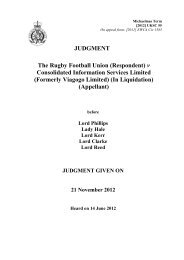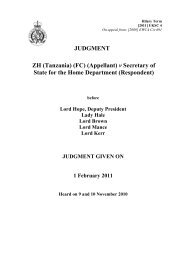Lies, damned lies: Abuse of process and the dishonest litigant
Lies, damned lies: Abuse of process and the dishonest litigant
Lies, damned lies: Abuse of process and the dishonest litigant
Create successful ePaper yourself
Turn your PDF publications into a flip-book with our unique Google optimized e-Paper software.
<strong>Lies</strong>, <strong>damned</strong> <strong>lies</strong>: <strong>Abuse</strong> <strong>of</strong> <strong>process</strong> <strong>and</strong> <strong>the</strong> <strong>dishonest</strong> <strong>litigant</strong> 1<br />
The Rt Hon Lord Reed<br />
26 October 2012<br />
One <strong>of</strong> <strong>the</strong> problems which a lawyer in civil practice is likely to encounter is <strong>the</strong> <strong>dishonest</strong> client.<br />
There are clients whose case would involve revealing previous <strong>dishonest</strong>y: for example, <strong>the</strong><br />
builder who wants to recover lost pr<strong>of</strong>its on a contract for carrying out grant-aided works <strong>and</strong><br />
whose records reveal that <strong>the</strong> prices on which <strong>the</strong> grant claims were based were different from<br />
<strong>the</strong> prices actually charged, or <strong>the</strong> personal injury claimant who wants to recover for <strong>the</strong> loss <strong>of</strong><br />
undeclared earnings <strong>and</strong> who was fraudulently claiming benefits. Then <strong>the</strong>re are clients who<br />
resort to <strong>dishonest</strong>y outside <strong>the</strong> court in order to win <strong>the</strong>ir case. I remember, from my early days<br />
at <strong>the</strong> Bar, a very senior colleague relating his appearance before a licensing board. The hearing<br />
went with so little difficulty <strong>and</strong> was over so quickly that he felt he had to explain to <strong>the</strong> client<br />
that he would never<strong>the</strong>less have to charge a day’s fee. “Dinnae you worry, son”, said <strong>the</strong> client,<br />
“you were <strong>the</strong> cheapest man <strong>the</strong>re”. Then <strong>the</strong>re are clients who set out to deceive <strong>the</strong> court.<br />
Some <strong>dishonest</strong>y is relatively venial. George Emslie QC is said to have begun his cross-<br />
examination <strong>of</strong> <strong>the</strong> Duchess <strong>of</strong> Argyll in <strong>the</strong> Argyll divorce case 2 by challenging <strong>the</strong> answer she<br />
had given at <strong>the</strong> beginning <strong>of</strong> her evidence, when asked what her age was, concluding “So that is<br />
<strong>the</strong> first lie”. O<strong>the</strong>r <strong>dishonest</strong>y is more serious. Ano<strong>the</strong>r example from my early days at <strong>the</strong> Bar<br />
was an intellectual property action in which <strong>the</strong> defender claimed to have designed an anchor<br />
which was remarkably similar to one which <strong>the</strong> pursuers had already patented. 3 When <strong>the</strong><br />
defender was cross-examined, he was eventually compelled to admit that, contrary to his earlier<br />
evidence that he had graduated in engineering from Aberdeen University, he had in fact never<br />
1 This lecture was delivered at <strong>the</strong> University <strong>of</strong> Edinburgh on 26 October 2012 as <strong>the</strong> fifth Annual Lecture at <strong>the</strong><br />
Centre for Commercial Law.<br />
2 Duke <strong>of</strong> Argyll v Duchess <strong>of</strong> Argyll 1962 SC (HL) 88.<br />
3 Brupart Ltd v Hoseason Smith, unreported, 1984. An account appears in <strong>the</strong> Glasgow Herald, 31 August 1984.<br />
1
een a student <strong>the</strong>re <strong>and</strong> had no qualifications in engineering. He collapsed (or at least purported<br />
to collapse) in <strong>the</strong> witness box <strong>and</strong> completed giving his evidence from hospital. The judge<br />
discharged his legal aid certificate, <strong>and</strong> he was sequestrated. 4<br />
There are different ways in which <strong>the</strong> law addresses <strong>the</strong> problem <strong>of</strong> <strong>dishonest</strong> <strong>litigant</strong>s.<br />
Dishonesty in <strong>the</strong> conduct <strong>of</strong> litigation falls within <strong>the</strong> ambit <strong>of</strong> <strong>the</strong> criminal law, as <strong>the</strong><br />
convictions <strong>of</strong> Jeffrey Archer, Jonathan Aitken <strong>and</strong> Tommy Sheridan demonstrated. When <strong>the</strong><br />
pro<strong>of</strong> <strong>of</strong> a case discloses antecedent <strong>dishonest</strong>y, <strong>the</strong> court may refer <strong>the</strong> case to <strong>the</strong> prosecuting<br />
authorities: a possibility which I sometimes drew to <strong>the</strong> attention <strong>of</strong> counsel in commercial cases,<br />
<strong>and</strong> which proved to be an effective technique for achieving a speedy resolution <strong>of</strong> disputes. The<br />
court can also use its power to punish contempt, or it can penalise a party in relation to expenses<br />
or in its award <strong>of</strong> interest. 5 Where a claim is inherently tainted by crime or o<strong>the</strong>r illegality, <strong>the</strong><br />
court may withhold its assistance on <strong>the</strong> basis <strong>of</strong> principles <strong>of</strong> substantive law.<br />
What I propose to discuss is how <strong>the</strong> courts deal with <strong>litigant</strong>s who set out to deceive <strong>the</strong><br />
court: who produce forged documents, or conceal <strong>the</strong> existence <strong>of</strong> relevant documents, or give<br />
untruthful evidence. I am not concerned with cases where <strong>the</strong> court only concludes that <strong>the</strong>re<br />
has been <strong>dishonest</strong>y in its findings after pro<strong>of</strong>. A finding at that stage that a document was<br />
forged or suppressed, or that a party told <strong>lies</strong> in his evidence, is part <strong>of</strong> <strong>the</strong> court’s ordinary<br />
adjudicative function. The judge may decide to punish <strong>the</strong> party for contempt, or refer <strong>the</strong> case<br />
to <strong>the</strong> prosecuting authorities, but he or she will never<strong>the</strong>less have adjudicated on <strong>the</strong> dispute.<br />
Where on <strong>the</strong> o<strong>the</strong>r h<strong>and</strong> it is established prior to pro<strong>of</strong>, possibly as <strong>the</strong> result <strong>of</strong> an admission or<br />
a preliminary pro<strong>of</strong>, or where it becomes apparent during <strong>the</strong> pro<strong>of</strong>, that one <strong>of</strong> <strong>the</strong> parties is<br />
seeking to subvert <strong>the</strong> <strong>process</strong> <strong>of</strong> <strong>the</strong> court by fraudulent means, <strong>the</strong> court has to decide whe<strong>the</strong>r<br />
<strong>the</strong> case should be allowed to proceed any fur<strong>the</strong>r. It has essentially two choices. It can decide to<br />
carry on notwithst<strong>and</strong>ing <strong>the</strong> party’s efforts to subvert <strong>the</strong> court <strong>process</strong>, <strong>and</strong> do <strong>the</strong> best it can<br />
in <strong>the</strong> circumstances, or it can decide to dismiss <strong>the</strong> party’s case <strong>the</strong>re <strong>and</strong> <strong>the</strong>n.<br />
4 I have been told that he was also imprisoned for contempt <strong>of</strong> court, but have been unable to verify that.<br />
5 Summers v Fairclough Homes Ltd [2012] 1 WLR 2004.<br />
2
There is relatively little case law on this subject in Scotl<strong>and</strong>. There is a larger body <strong>of</strong> case<br />
law in Engl<strong>and</strong>. The English cases however reveal more than one approach. The recent English<br />
cases also reflect <strong>the</strong> influence <strong>of</strong> <strong>the</strong> Civil Procedure Rules, <strong>and</strong> <strong>the</strong> overriding objective under<br />
those rules <strong>of</strong> dealing with cases justly, in a way which is proportionate to <strong>the</strong> amount <strong>of</strong> money<br />
involved, <strong>the</strong> importance <strong>of</strong> <strong>the</strong> case, <strong>the</strong> complexity <strong>of</strong> <strong>the</strong> issues <strong>and</strong> <strong>the</strong> financial position <strong>of</strong><br />
each party. They are for that reason <strong>of</strong> interest in Scotl<strong>and</strong> as we await <strong>the</strong> implementation <strong>of</strong> <strong>the</strong><br />
reforms recommended by <strong>the</strong> Report <strong>of</strong> <strong>the</strong> Scottish Civil Courts Review, chaired by Lord Gill. Those<br />
recommendations include <strong>the</strong> adoption <strong>of</strong> a guiding principle which embodies <strong>the</strong> fundamental<br />
purpose <strong>of</strong> <strong>the</strong> rules <strong>of</strong> court <strong>and</strong> <strong>of</strong> <strong>the</strong> underlying system <strong>of</strong> procedure. That guiding principle<br />
is to provide parties with a just resolution <strong>of</strong> <strong>the</strong>ir dispute in accordance with <strong>the</strong>ir substantive<br />
rights, in a fair manner with due regard to economy, proportionality <strong>and</strong> <strong>the</strong> efficient use <strong>of</strong> <strong>the</strong><br />
resources <strong>of</strong> <strong>the</strong> parties <strong>and</strong> <strong>of</strong> <strong>the</strong> court. 6 That is evidently similar to <strong>the</strong> overriding objective <strong>of</strong><br />
<strong>the</strong> CPR, but it is described as a “guiding” principle in order to make it clear that it does not<br />
override <strong>the</strong> express terms <strong>of</strong> <strong>the</strong> rules.<br />
One can discern in <strong>the</strong> case law at least four approaches to <strong>the</strong> problem <strong>of</strong> <strong>dishonest</strong><br />
<strong>litigant</strong>s. One is that <strong>the</strong> court’s power to punish contempt encompasses <strong>the</strong> power to dismiss<br />
<strong>the</strong> action. A second is that <strong>the</strong> <strong>litigant</strong> who resorts to forgery, perjury <strong>and</strong> <strong>the</strong> suppression <strong>of</strong><br />
evidence in order to prevent <strong>the</strong> court from finding out <strong>the</strong> truth ipso facto forfeits his right to<br />
have <strong>the</strong> court hear his case. A third is that <strong>the</strong> court should adjudicate upon <strong>the</strong> issues between<br />
<strong>the</strong> parties as long as <strong>the</strong> <strong>dishonest</strong> <strong>litigant</strong>’s conduct has not rendered it impossible to hold a fair<br />
trial. A fourth approach brings to bear <strong>the</strong> overriding objective <strong>of</strong> <strong>the</strong> CPR. It holds that, since a<br />
<strong>litigant</strong> who resorts to forgery, perjury <strong>and</strong> <strong>the</strong> like imposes an unnecessary burden on court<br />
resources, which may be at least as great as that imposed by a <strong>litigant</strong> who fails to comply with<br />
<strong>the</strong> rules <strong>of</strong> court or breaches <strong>the</strong> court’s orders, he too may have his case struck out. On this<br />
approach, <strong>the</strong> court should proceed only as long as it is in accordance with <strong>the</strong> overriding<br />
6 Report <strong>of</strong> <strong>the</strong> Scottish Civil Courts Review (2009), Ch 9, paras 11 <strong>and</strong> 13.<br />
3
objective, <strong>and</strong> <strong>the</strong>refore only as long as it remains possible to deal with <strong>the</strong> case justly <strong>and</strong><br />
without <strong>the</strong> investment <strong>of</strong> disproportionate resources.<br />
The first reported Scottish case in which <strong>the</strong> problem appears to have been considered is<br />
Levison v Jewish Chronicle Ltd, 7 a defamation action where <strong>the</strong> issue was whe<strong>the</strong>r <strong>the</strong> pursuer was a<br />
Rabbi, as he claimed. He lodged in <strong>process</strong> documents establishing his credentials as a Rabbi, but<br />
<strong>the</strong> defenders alleged that <strong>the</strong>y were fabrications. His solicitor <strong>the</strong>n borrowed <strong>the</strong> productions<br />
<strong>and</strong> put <strong>the</strong>m in <strong>the</strong> pursuer’s h<strong>and</strong>s. When <strong>the</strong>y were returned to <strong>the</strong> court, <strong>the</strong> alleged forgeries<br />
had disappeared. The pursuer said that he had borrowed <strong>the</strong> productions in order to use <strong>the</strong>m in<br />
support <strong>of</strong> an application for employment as a “Reverend”, as he put it, <strong>and</strong> <strong>the</strong> critical<br />
documents had become separated from <strong>the</strong> o<strong>the</strong>rs because he had not wanted <strong>the</strong> persons<br />
wishing to appoint a Reverend to know that he was actually a Rabbi. Lord Ashmore found <strong>the</strong><br />
pursuer in contempt <strong>of</strong> court. He also found that <strong>the</strong> absence <strong>of</strong> <strong>the</strong> documents would prejudice<br />
<strong>the</strong> defenders in <strong>the</strong> conduct <strong>of</strong> <strong>the</strong> defence. Stating that he doubted <strong>the</strong> appropriateness <strong>of</strong> a<br />
fine or imprisonment, he assoilzied <strong>the</strong> defenders <strong>and</strong> found <strong>the</strong>m entitled to <strong>the</strong>ir expenses, <strong>and</strong><br />
observed 8 that that disposal would not only be just to <strong>the</strong>m, but would sufficiently penalise <strong>the</strong><br />
pursuer for his unjustifiable <strong>and</strong> improper interference with <strong>the</strong> ordinary course <strong>of</strong> justice to <strong>the</strong><br />
serious prejudice <strong>of</strong> his opponents in <strong>the</strong> litigation. One does not find <strong>the</strong>re a clear choice<br />
between <strong>the</strong> contempt approach <strong>and</strong> <strong>the</strong> fair trial approach: Lord Ashmore was able, as it were,<br />
to kill both birds with one stone.<br />
The only o<strong>the</strong>r reported Scottish case I know <strong>of</strong> in which <strong>the</strong> problem has been<br />
considered is Shetl<strong>and</strong> Sea Farms Ltd v Assuranceforeningen Skuld, decided in 2001. 9 This was a claim<br />
by salmon farmers for compensation for losses caused by <strong>the</strong> grounding <strong>of</strong> an oil tanker, <strong>the</strong><br />
Braer. Lord Gill found that <strong>the</strong> case was based on false averments <strong>of</strong> fact supported by fabricated<br />
7 1924 SLT 755.<br />
8 At p 760.<br />
9 2004 SLT 30.<br />
4
documents. He said 10 that <strong>the</strong> court possessed an inherent power to strike out an action which<br />
amounted to an abuse <strong>of</strong> <strong>process</strong>. In doing so it protected <strong>the</strong> integrity <strong>of</strong> its procedures by<br />
preventing one party from putting <strong>the</strong> o<strong>the</strong>r at an unfair disadvantage <strong>and</strong> compromising <strong>the</strong> just<br />
<strong>and</strong> proper conduct <strong>of</strong> <strong>the</strong> proceedings. In support <strong>of</strong> this approach Lord Gill cited two<br />
influential articles discussing <strong>the</strong> inherent power <strong>of</strong> <strong>the</strong> court, <strong>and</strong> abuse <strong>of</strong> <strong>process</strong>, as those<br />
concepts had developed in Engl<strong>and</strong>. 11 There were many ways, he said, in which a <strong>litigant</strong> could<br />
abuse <strong>the</strong> <strong>process</strong> <strong>of</strong> <strong>the</strong> court: for example, by pursuing a claim or presenting a defence in bad<br />
faith <strong>and</strong> with no genuine belief in its merits, or by fraudulent means, or for an improper ulterior<br />
motive. A number <strong>of</strong> examples were given from <strong>the</strong> English case law, besides <strong>the</strong> Scottish case<br />
<strong>of</strong> Levison.<br />
This was an innovative judgment. It adopted a term, abuse <strong>of</strong> <strong>process</strong>, which as far as I<br />
know had never previously appeared in a Scottish judgment, but which was well established in<br />
Engl<strong>and</strong> <strong>and</strong> Wales, <strong>and</strong> in many o<strong>the</strong>r jurisdictions. It also employed ano<strong>the</strong>r term, inherent<br />
power or jurisdiction, which had not previously been used in this context in Scotl<strong>and</strong>, although<br />
again its use in that way was familiar in Engl<strong>and</strong>. Before going any fur<strong>the</strong>r, it may be helpful to<br />
say a word about this terminology.<br />
The power to dismiss a case summarily as an abuse <strong>of</strong> <strong>process</strong> was first employed in<br />
Engl<strong>and</strong> in 1875, in a case brought by Thomas Castro, <strong>the</strong> Tichborne claimant. After he had<br />
been held to be an impostor <strong>and</strong> imprisoned for perjury, he sought to challenge his conviction<br />
by a civil procedure which required <strong>the</strong> consent <strong>of</strong> <strong>the</strong> Attorney General. When <strong>the</strong> clerk<br />
declined to seal <strong>the</strong> writ, as <strong>the</strong> Attorney General had not given his consent, Castro sued <strong>the</strong><br />
clerk for half a million pounds in damages. The defendant immediately applied to <strong>the</strong> Court <strong>of</strong><br />
Exchequer to have <strong>the</strong> action stayed. After consulting all <strong>the</strong> Barons, <strong>the</strong> court decided that it<br />
had <strong>the</strong> power to dismiss <strong>the</strong> action summarily. Baron Bramwell said that <strong>the</strong> action was<br />
10 At paras 143-152.<br />
11 Jacob, “The Inherent Jurisdiction <strong>of</strong> <strong>the</strong> Court” (1970) 23 Current Legal Problems 23; Jolowicz, “<strong>Abuse</strong> <strong>of</strong> <strong>the</strong><br />
Process <strong>of</strong> <strong>the</strong> Court: H<strong>and</strong>le with Care” (1990) 43 Current Legal Problems 77.<br />
5
absolutely groundless, <strong>and</strong> was one in which <strong>the</strong> court, in <strong>the</strong> exercise <strong>of</strong> its discretion, ought to<br />
stop <strong>the</strong> proceedings as being an abuse <strong>of</strong> <strong>the</strong> <strong>process</strong> <strong>of</strong> <strong>the</strong> court. 12<br />
That decision was followed by <strong>the</strong> Queen’s Bench Division <strong>the</strong> following year in <strong>the</strong> case<br />
<strong>of</strong> Colonel William Dawkins, who brought repeated actions, all <strong>of</strong> which raised <strong>the</strong> same point,<br />
against <strong>the</strong> <strong>of</strong>ficers who had been involved in his being deprived <strong>of</strong> his commission following a<br />
court-martial. Eventually <strong>the</strong> court had had enough, <strong>and</strong> his latest action was immediately stayed.<br />
Blackburn J posed <strong>the</strong> question whe<strong>the</strong>r <strong>the</strong> court had <strong>the</strong> right to stop summarily an action<br />
which was “utterly hopeless”. He held that it did, following <strong>the</strong> precedent set by <strong>the</strong> case <strong>of</strong> <strong>the</strong><br />
Tichborne claimant. 13 Colonel Dawkins went on to become known to every law student, as I<br />
would like to hope, as <strong>the</strong> Dawkins <strong>of</strong> Dawkins v Antrobus. 14<br />
These cases established that <strong>the</strong> English courts had a common law power to stay or<br />
dismiss summarily actions which were an abuse <strong>of</strong> <strong>process</strong>, <strong>and</strong> demonstrated why such a power<br />
was necessary. There were <strong>of</strong> course o<strong>the</strong>r means, in Engl<strong>and</strong> as in Scotl<strong>and</strong>, by which a case<br />
which was bad in law could be disposed <strong>of</strong> without a trial <strong>of</strong> <strong>the</strong> facts, but those means were not<br />
sufficiently drastic to deal with <strong>the</strong> situation where <strong>the</strong> action was so plainly unsustainable as to<br />
be an abuse <strong>of</strong> <strong>the</strong> <strong>process</strong> <strong>of</strong> <strong>the</strong> court. By <strong>the</strong> early twentieth century, <strong>the</strong> power to stay or<br />
dismiss actions which were an abuse <strong>of</strong> <strong>process</strong> was regarded in Engl<strong>and</strong> as an aspect <strong>of</strong> <strong>the</strong><br />
inherent jurisdiction <strong>of</strong> <strong>the</strong> court 15 : that is to say, <strong>the</strong> powers which <strong>the</strong> court possesses simply by<br />
virtue <strong>of</strong> being a court, because <strong>the</strong>y are essential to its proper functioning.<br />
The principle that <strong>the</strong> court possesses inherent powers was also long established in<br />
Scotl<strong>and</strong>. Erskine had written in <strong>the</strong> eighteenth century that ‘‘in all grants <strong>of</strong> jurisdiction, whe<strong>the</strong>r<br />
civil or criminal, supreme or inferior, every power is understood to be conferred without which<br />
<strong>the</strong> jurisdiction cannot be explicated . . . [E]very judge, however limited his jurisdiction may be, is<br />
vested with all <strong>the</strong> powers necessary … for supporting his jurisdiction <strong>and</strong> maintaining <strong>the</strong><br />
12 Castro v Murray (1875) LR 10 Ex 213, 218.<br />
13 Dawkins v Prince Edward <strong>of</strong> Saxe Weimar (1876) 1 QBD 499, 502.<br />
14 (1881) 17 Ch D 615.<br />
15 Winfield, <strong>Abuse</strong> <strong>of</strong> Process (Cambridge, 1921), p 239.<br />
6
authority <strong>of</strong> <strong>the</strong> court, or for <strong>the</strong> execution <strong>of</strong> his decrees.’’ 16 In cases concerned with contempt<br />
<strong>of</strong> court, Lord Justice General Emslie said that both <strong>the</strong> Court <strong>of</strong> Session <strong>and</strong> <strong>the</strong> High Court <strong>of</strong><br />
Justiciary had an inherent jurisdiction to take effective action to vindicate <strong>the</strong>ir authority <strong>and</strong><br />
preserve <strong>the</strong> due <strong>and</strong> impartial administration <strong>of</strong> justice. 17<br />
The court’s inherent powers have however a wider scope than <strong>the</strong> punishment <strong>of</strong><br />
contempt <strong>of</strong> court: <strong>the</strong>y include, for example, <strong>the</strong> supervisory jurisdiction <strong>of</strong> <strong>the</strong> Court <strong>of</strong><br />
Session, <strong>the</strong> summary dismissal <strong>of</strong> proceedings which are frivolous or vexatious, countless o<strong>the</strong>r<br />
aspects <strong>of</strong> <strong>the</strong> regulation <strong>of</strong> practice <strong>and</strong> proceedings, <strong>and</strong> taking notice <strong>of</strong> matters which are pars<br />
judicis, such as <strong>the</strong> illegality <strong>of</strong> a claim, 18 or objections arising under <strong>the</strong> maxim ex turpi causa non<br />
oritur actio. 19 And one can find in <strong>the</strong> Scottish case law at least one authoritative example, long<br />
before <strong>the</strong> Shetl<strong>and</strong> Sea Farms case, <strong>of</strong> <strong>the</strong> court exercising an inherent power to dismiss an action<br />
not on <strong>the</strong> merits but because it was, in ordinary language, an abuse <strong>of</strong> <strong>the</strong> <strong>process</strong> <strong>of</strong> <strong>the</strong> court.<br />
The case in question is Glasgow Navigation Co Ltd v Iron Ore Co Ltd, 20 decided by <strong>the</strong> House<br />
<strong>of</strong> Lords in 1910. The owners <strong>of</strong> a ship had pursued <strong>the</strong> charterers for demurrage. When <strong>the</strong> case<br />
reached <strong>the</strong> House <strong>of</strong> Lords, following a pro<strong>of</strong> in <strong>the</strong> Sheriff Court <strong>and</strong> intermediate appeals,<br />
<strong>the</strong>ir Lordships spotted a clause in <strong>the</strong> charter party which excluded liability for demurrage. The<br />
parties <strong>the</strong>n explained that <strong>the</strong>y had agreed that if <strong>the</strong> case was tried in Scotl<strong>and</strong> <strong>the</strong> clause would<br />
not be relied upon, <strong>and</strong> that <strong>the</strong>re was a bill <strong>of</strong> lading under which <strong>the</strong> charterers were arguably<br />
liable for demurrage. The bill <strong>of</strong> lading however had not been produced. The House ordered that<br />
<strong>the</strong> action should be dismissed, <strong>the</strong> Lord Chancellor observing 21 that <strong>the</strong> court was asked to<br />
decide not upon a contract actually made, but upon a contract which never was made, <strong>and</strong><br />
16 Erskine, Institute, I, ii,.8.<br />
17 Cordiner, Petr 1973 JC16, 18. See also Hall v Associated Newspapers 1979 JC 1, a decision <strong>of</strong> a bench <strong>of</strong> five judges,<br />
where Lord Justice General Emslie spoke (p 9) <strong>of</strong> <strong>the</strong> court’s inherent jurisdiction to vindicate <strong>the</strong> fair <strong>and</strong> impartial<br />
administration <strong>of</strong> justice<br />
18 See eg Stewart v Gibson (1840) 1 Rob 260; Gloag,, Contract , 2 nd ed, p 549.<br />
19 See eg Bile Bean Manufacturing Co v Davidson (1906) 8F 1181. Recent examples include Gray v Thames Trains Ltd<br />
[2009] 1 AC 1339 <strong>and</strong> Stone & Rolls Ltd (In Liquidation) v Moore Stephens (A Firm) [2009] 1 AC 1391.<br />
20 1910 SC (HL) 63; [1910] AC 293.<br />
21 At 64.<br />
7
<strong>the</strong>reby what in real substance was a feigned issue had been presented to <strong>the</strong> House. Under those<br />
circumstances <strong>the</strong>re was nothing to be done except to dismiss <strong>the</strong> action altoge<strong>the</strong>r.<br />
Returning to <strong>the</strong> Shetl<strong>and</strong> Sea Farms case, Lord Gill held that to found a claim on a false<br />
narrative <strong>of</strong> fact supported by fabricated documents was an abuse <strong>of</strong> <strong>process</strong>. Where a <strong>litigant</strong><br />
had been guilty <strong>of</strong> <strong>dishonest</strong>y in <strong>the</strong> prosecution <strong>of</strong> his case, <strong>the</strong> court’s disposal <strong>of</strong> <strong>the</strong> matter<br />
must depend on <strong>the</strong> question whe<strong>the</strong>r <strong>the</strong> <strong>dishonest</strong>y had made a fair trial <strong>of</strong> <strong>the</strong> issue<br />
impossible. Lord Gill referred in that connection to <strong>the</strong> judgment <strong>of</strong> Chadwick LJ in Arrow<br />
Nominees Inc v Blackledge. 22 If <strong>the</strong> <strong>dishonest</strong>y made a fair trial impossible, <strong>the</strong> court had a duty to<br />
stop <strong>the</strong> proceedings in order to protect <strong>the</strong> innocent party from an injustice. But if <strong>the</strong><br />
<strong>dishonest</strong>y was found out <strong>and</strong> a fair trial <strong>of</strong> <strong>the</strong> claim remained possible, <strong>the</strong> court ought not to<br />
stop <strong>the</strong> proceedings. To do so in such circumstances, Lord Gill said, would simply be judicial<br />
retaliation for <strong>the</strong> affront to <strong>the</strong> court.<br />
The approach adopted by Lord Gill earned <strong>the</strong> approval <strong>of</strong> Lord Justice Clerk Gill in <strong>the</strong><br />
case <strong>of</strong> Clarke v Fennosc<strong>and</strong>ia Ltd (No 3), decided in 2004. 23 There <strong>the</strong> pursuer sought a declarator<br />
from <strong>the</strong> Court <strong>of</strong> Session that judgments obtained against him in <strong>the</strong> USA had been obtained by<br />
fraud. He had previously brought three similar actions in Engl<strong>and</strong> <strong>and</strong> <strong>the</strong> USA, all unsuccessful,<br />
<strong>and</strong> <strong>the</strong> defenders had undertaken not to enforce <strong>the</strong> judgments in Scotl<strong>and</strong>. The action was<br />
dismissed. On appeal, <strong>the</strong> Lord Justice Clerk observed that <strong>the</strong> concept <strong>of</strong> an abuse <strong>of</strong> <strong>process</strong><br />
need not be confined to fraud. The essential question, he said, was whe<strong>the</strong>r <strong>the</strong> action<br />
compromised <strong>the</strong> integrity <strong>of</strong> <strong>the</strong> court’s procedures. It might do so if it wastefully occupied <strong>the</strong><br />
time <strong>and</strong> resources <strong>of</strong> <strong>the</strong> court in a claim that was obviously without merit. 24<br />
22 [2001] BCC 591.<br />
23 Clarke v Fennosc<strong>and</strong>ia Ltd (No 3) 2005 SLT 511.<br />
24 At para17. The o<strong>the</strong>r members <strong>of</strong> <strong>the</strong> court agreed, at paras 40 <strong>and</strong> 44. When <strong>the</strong> case proceeded to <strong>the</strong> House <strong>of</strong><br />
Lords, Lord Rodger <strong>of</strong> Earlsferry observed that it was not competent to pursue proceedings for an illegitimate<br />
purpose: Clarke v Fennosc<strong>and</strong>ia Ltd 2008 SC (HL) 122, para 35.<br />
8
The idea that <strong>the</strong> court had an inherent power to dismiss summarily actions which were<br />
an abuse <strong>of</strong> <strong>process</strong>, being new, did not readily gain acceptance. In Wright v Paton Farrell, 25 a case<br />
concerned with an advocate’s immunity from suit, decided in 2006, Lord Osborne accepted that<br />
in principle any court had an inherent power to prevent abuses <strong>of</strong> <strong>process</strong>, but considered that<br />
<strong>the</strong> Scottish courts could not exercise such a power because it had not been crystallised in rules<br />
<strong>of</strong> court. 26 Lord Johnston agreed, <strong>and</strong> Lord President Hamilton expressed similar doubts. 27<br />
The argument that <strong>the</strong> court could not exercise an inherent power unless it had been set<br />
out in rules <strong>of</strong> court was however demolished in <strong>the</strong> case <strong>of</strong> Tonner v Reiach <strong>and</strong> Hall, decided in<br />
2007. 28 The issue in that case was want <strong>of</strong> prosecution: <strong>the</strong> case had been sisted for 19 years. The<br />
court held that it had an inherent power to dismiss an action where <strong>the</strong>re had been inordinate<br />
<strong>and</strong> inexcusable delay in its prosecution <strong>and</strong> <strong>the</strong> interests <strong>of</strong> justice required that <strong>the</strong> action be<br />
brought to an end. It did not however base its decision upon abuse <strong>of</strong> <strong>process</strong>, but held that <strong>the</strong><br />
court’s power to regulate its practice <strong>and</strong> procedure enabled it to dismiss an action where <strong>the</strong>re<br />
had been inordinate <strong>and</strong> inexcusable delay. The court questioned <strong>the</strong> use <strong>of</strong> <strong>the</strong> concept <strong>of</strong> abuse<br />
<strong>of</strong> <strong>process</strong> in relation to <strong>the</strong> earlier Scottish cases. It interpreted <strong>the</strong> case <strong>of</strong> Levison as one where<br />
<strong>the</strong> court had exercised its power to punish contempt <strong>of</strong> court. While in Shetl<strong>and</strong> Sea Farms Lord<br />
Gill had referred to abuse <strong>of</strong> <strong>process</strong>, <strong>the</strong> conduct in that case could, it said, equally well have<br />
been categorised as a contempt <strong>of</strong> court. The observations about abuse <strong>of</strong> <strong>process</strong> in <strong>the</strong><br />
Fennosc<strong>and</strong>ia case had been obiter. 29<br />
The existence <strong>of</strong> a power to dismiss an action where <strong>the</strong>re had been an abuse <strong>of</strong> <strong>process</strong><br />
was finally put beyond doubt in Moore v Scottish Daily Record <strong>and</strong> Sunday Mail Ltd, decided in 2008.<br />
The case concerned <strong>the</strong> question whe<strong>the</strong>r <strong>the</strong> court could impose a penalty in court fees for late<br />
settlement. Lord Justice Clerk Gill, presiding in a court <strong>of</strong> five judges, said that <strong>the</strong> court had an<br />
25 2006 SC 404.<br />
26 Para 164.<br />
27 Para 20.<br />
28 2008 SC 1.<br />
29 Tonner v Reiach <strong>and</strong> Hall 2008 SC 1, paras 83-84.<br />
9
undoubted inherent jurisdiction to take action where <strong>the</strong>re had been a contempt <strong>of</strong> court or an<br />
abuse <strong>of</strong> <strong>process</strong>, or where for some o<strong>the</strong>r reason a fair trial <strong>of</strong> a case had become impossible. It<br />
was, he said, well established in Scots law that <strong>the</strong> court could exercise its inherent jurisdiction in<br />
<strong>the</strong> case <strong>of</strong> an abuse <strong>of</strong> <strong>process</strong> by way <strong>of</strong> a procedural sanction such as dismissal. 30 Ironically,<br />
Tonner was cited as authority for that proposition. The inherent jurisdiction did not however<br />
enable <strong>the</strong> court to require <strong>the</strong> payment <strong>of</strong> court fees, 31 since that was a matter governed by<br />
statute.<br />
The last Scottish case I need mention is Hepburn v Royal Alex<strong>and</strong>ria NHS Trust, 32 ano<strong>the</strong>r<br />
case concerned with want <strong>of</strong> prosecution. The First Division held by a majority, following<br />
Tonner, that <strong>the</strong> court could dismiss an action where <strong>the</strong>re had been inordinate <strong>and</strong> inexcusable<br />
delay as a result <strong>of</strong> which it could not be satisfied that a just determination <strong>of</strong> <strong>the</strong> dispute<br />
remained possible. The court held that it must have an inherent power to prevent its procedures<br />
being used to achieve injustice. The way I put it in my opinion was to say that if <strong>the</strong>re has been<br />
such a delay in proceedings that <strong>the</strong> court cannot be satisfied that a just determination <strong>of</strong> <strong>the</strong><br />
dispute remains possible, <strong>the</strong> only course open to <strong>the</strong> court, consistent with its function as a<br />
court <strong>of</strong> justice, is to bring <strong>the</strong> proceedings to an end. 33 I sought to make it clear that that should<br />
not be taken as an exhaustive formulation. To keep an action in court indefinitely with no<br />
intention <strong>of</strong> bringing it to a conclusion, for example, could be an abuse <strong>of</strong> <strong>process</strong> which should<br />
be stopped regardless <strong>of</strong> whe<strong>the</strong>r a fair trial <strong>of</strong> <strong>the</strong> action remained possible. 34 That point had<br />
been made earlier by Lord Woolf MR in <strong>the</strong> case <strong>of</strong> Arbuthnot Latham Bank Ltd v Trafalgar<br />
Holdings Ltd, 35 where he said that “abuse <strong>of</strong> <strong>process</strong> … does not depend on <strong>the</strong> need to show<br />
prejudice to <strong>the</strong> defendant or that a fair trial is no longer possible.” That statement was treated as<br />
30 Moore v Scottish Daily Record <strong>and</strong> Scottish Sunday Mail Ltd 2009 SC 178, paras 13-14.<br />
31 Contrary to <strong>the</strong> earlier decision in Billig v Council <strong>of</strong> <strong>the</strong> Law Society <strong>of</strong> Scotl<strong>and</strong> 2008 SC 150.<br />
32 2011 SC 20.<br />
33 Para 47.<br />
34 Paras 48-50.<br />
35 [1998] 1 WLR 1426, 1436.<br />
10
an established proposition by <strong>the</strong> Supreme Court in its judgment earlier this year in Summers v<br />
Fairclough Homes Ltd. 36<br />
So, <strong>the</strong> only Scottish cases concerned with <strong>dishonest</strong> <strong>litigant</strong>s remain Levison - a case from<br />
which it is difficult to extract a clear principle – <strong>and</strong> Shetl<strong>and</strong> Sea Farms. Lord Gill’s rejection in<br />
that case <strong>of</strong> <strong>the</strong> idea that <strong>the</strong> court should dismiss an action in retaliation for <strong>the</strong> affront to <strong>the</strong><br />
court points to why, in Tonner, <strong>the</strong> Extra Division were I think mistaken to suggest that <strong>the</strong><br />
earlier cases should be understood as being concerned with <strong>the</strong> punishment <strong>of</strong> contempt <strong>of</strong><br />
court. The first reason given by Lord Ashmore for his decision in <strong>the</strong> Levison case was that <strong>the</strong><br />
pursuer’s conduct had prejudiced <strong>the</strong> defence <strong>of</strong> <strong>the</strong> action: in o<strong>the</strong>r words, a just determination<br />
<strong>of</strong> <strong>the</strong> dispute had been compromised. Similarly, <strong>the</strong> ratio <strong>of</strong> Lord Gill’s decision in <strong>the</strong> Shetl<strong>and</strong><br />
Sea Farms case was that, despite <strong>the</strong> fraud <strong>and</strong> forgery, a fair trial <strong>of</strong> <strong>the</strong> claim remained possible.<br />
In each case <strong>the</strong> court’s focus was upon whe<strong>the</strong>r one party had put <strong>the</strong> o<strong>the</strong>r at an unfair<br />
disadvantage <strong>and</strong> compromised <strong>the</strong> just <strong>and</strong> proper conduct <strong>of</strong> <strong>the</strong> proceedings.<br />
I agree that dismissal is not an appropriate punishment for contempt <strong>of</strong> court. As <strong>the</strong><br />
Supreme Court said in Summers v Fairclough Homes Ltd, “<strong>the</strong> power to strike out is not a power to<br />
punish but to protect <strong>the</strong> court’s <strong>process</strong>.” 37 Of course, that is not to say that <strong>dishonest</strong>y should<br />
not be punished as a contempt <strong>of</strong> court: on <strong>the</strong> contrary. In Summers <strong>the</strong> Supreme Court<br />
endorsed <strong>the</strong> recent trend in Engl<strong>and</strong> to commit fraudulent <strong>litigant</strong>s for contempt, <strong>and</strong><br />
approved 38 a statement made by Moses LJ 39 where he pointed out that our system <strong>of</strong> adversarial<br />
justice depends upon openness, transparency <strong>and</strong> honesty, <strong>and</strong> said that those who make false<br />
claims should expect to go to prison if caught. The Supreme Court approved Moses LJ’s<br />
statement that <strong>the</strong>re is no o<strong>the</strong>r way to underline <strong>the</strong> gravity <strong>of</strong> <strong>the</strong> conduct, to deter those who<br />
may be tempted to make such claims, <strong>and</strong> to improve <strong>the</strong> administration <strong>of</strong> justice.<br />
36 [2012] 1 WLR 2004, para 35.<br />
37 [2012] 1 WLR 2004, para 45.<br />
38 Paras 57-58.<br />
39 South Wales Fire <strong>and</strong> Rescue Service v Smith [2011] EWHC 1749 (Admin).<br />
11
The Scottish cases on <strong>dishonest</strong>y do not, <strong>the</strong>n, adopt <strong>the</strong> view that dismissal may be a<br />
penalty for contempt. Lord Gill made some observations which might suggest that case<br />
management considerations are relevant, when he said that <strong>the</strong> claimant had misused <strong>the</strong> time<br />
<strong>and</strong> resources <strong>of</strong> <strong>the</strong> court <strong>and</strong> had delayed <strong>the</strong> progress <strong>of</strong> <strong>the</strong> proceedings, <strong>and</strong> <strong>of</strong> o<strong>the</strong>r<br />
proceedings. But when he came to express a principle he appeared to adopt <strong>the</strong> fair trial<br />
approach: <strong>the</strong> court’s disposal <strong>of</strong> <strong>the</strong> matter must depend on <strong>the</strong> question whe<strong>the</strong>r <strong>the</strong><br />
<strong>dishonest</strong>y had made a fair trial <strong>of</strong> <strong>the</strong> issue impossible. He cited in support <strong>of</strong> that approach<br />
Chadwick LJ’s judgment in Arrow Nominees, where, as I shall explain, <strong>the</strong> concept <strong>of</strong> a fair trial<br />
was however given a wide meaning which encompassed case management considerations.<br />
The later Scottish cases concerned with abuse <strong>of</strong> <strong>process</strong> indicate that it would be a<br />
mistake to think that <strong>the</strong> court is only concerned to protect <strong>the</strong> interest <strong>of</strong> <strong>the</strong> innocent party.<br />
Indeed, in a case <strong>of</strong> <strong>dishonest</strong>y, <strong>the</strong>re may be no innocent party: in one <strong>of</strong> <strong>the</strong> leading modern<br />
English cases, both parties produced forged documents <strong>and</strong> perjured testimony; 40 <strong>and</strong> in <strong>the</strong><br />
Glasgow Navigation case, both parties wanted <strong>the</strong> court to proceed on a false basis, albeit without<br />
any <strong>dishonest</strong> intention. As Lord Blackburn once said, in an <strong>of</strong>ten-quoted passage, 41 <strong>the</strong> court<br />
has <strong>the</strong> right to protect itself against <strong>the</strong> abuse <strong>of</strong> its <strong>process</strong>. The Supreme Court emphasised this<br />
point in <strong>the</strong> case <strong>of</strong> Summers, stating that it was for <strong>the</strong> court to protect <strong>the</strong> court’s <strong>process</strong>, <strong>and</strong><br />
that <strong>the</strong> power to strike out existed in <strong>the</strong> public interest. 42 That is implicit in <strong>the</strong> fact that <strong>the</strong><br />
court can act ex proprio motu. The central idea <strong>the</strong>refore, as I underst<strong>and</strong> it, is to safeguard <strong>the</strong><br />
administration <strong>of</strong> justice. A party who uses court <strong>process</strong> for <strong>the</strong> commission <strong>of</strong> a crime or a civil<br />
wrong is abusing it. A court which allows its <strong>process</strong> to be abused in that way will lose public<br />
confidence. The court protects itself by not tolerating such abuse. There is a link to <strong>the</strong> rationale<br />
<strong>of</strong> <strong>the</strong> court’s refusal to enforce illegal contracts or o<strong>the</strong>r claims based on turpitude, albeit in<br />
those contexts <strong>the</strong> court addresses <strong>the</strong> problem via substantive ra<strong>the</strong>r than procedural law.<br />
40 Masood v Zahoor (Practice Note) [2010] 1 WLR 746.<br />
41 Metropolitan Bank v Pooley (1885) 10 App Cas 210,220-221.<br />
42 [2012] 1 WLR 2004, paras 45 <strong>and</strong> 48.<br />
12
I want to turn now to two <strong>of</strong> <strong>the</strong> recent English authorities. The first <strong>of</strong> <strong>the</strong>se is <strong>the</strong> case<br />
<strong>of</strong> Arrow Nominees Inc v Blackledge. That was a case in which <strong>the</strong> court struck out a company law<br />
petition alleging unfairly prejudicial conduct where one <strong>of</strong> <strong>the</strong> petitioners had produced forged<br />
documents <strong>and</strong>, at <strong>the</strong> trial, was unwilling to make a frank disclosure <strong>of</strong> <strong>the</strong> extent <strong>of</strong> his<br />
fraudulent conduct <strong>and</strong> persisted in his attempts to deceive. Chadwick LJ stated that where a<br />
<strong>litigant</strong>'s conduct puts <strong>the</strong> fairness <strong>of</strong> <strong>the</strong> trial in jeopardy, where it is such that any judgment in<br />
favour <strong>of</strong> <strong>the</strong> <strong>litigant</strong> would have to be regarded as unsafe, or where it amounts to such an abuse<br />
<strong>of</strong> <strong>the</strong> <strong>process</strong> <strong>of</strong> <strong>the</strong> court as to render fur<strong>the</strong>r proceedings unsatisfactory <strong>and</strong> to prevent <strong>the</strong><br />
court from doing justice, <strong>the</strong> court is entitled - indeed, bound - to refuse to allow that <strong>litigant</strong> to<br />
take fur<strong>the</strong>r part in <strong>the</strong> proceedings <strong>and</strong> to determine <strong>the</strong> proceedings against him. The reason,<br />
he explained, is that it is no part <strong>of</strong> <strong>the</strong> court's function to proceed to trial if to do so would give<br />
rise to a substantial risk <strong>of</strong> injustice. 43 That seems to be following what I have called <strong>the</strong> fair trial<br />
approach. But his Lordship <strong>the</strong>n said this:<br />
“In this context, a fair trial is a trial which is conducted without an undue expenditure <strong>of</strong><br />
time <strong>and</strong> money; <strong>and</strong> with a proper regard to <strong>the</strong> dem<strong>and</strong>s <strong>of</strong> o<strong>the</strong>r <strong>litigant</strong>s upon <strong>the</strong><br />
finite resources <strong>of</strong> <strong>the</strong> court. The court does not do justice to <strong>the</strong> o<strong>the</strong>r parties to <strong>the</strong><br />
proceedings in question if it allows its <strong>process</strong> to be abused so that <strong>the</strong> real point in issue<br />
becomes subordinated to an investigation into <strong>the</strong> effect which <strong>the</strong> admittedly fraudulent<br />
conduct <strong>of</strong> one party in connection with <strong>the</strong> <strong>process</strong> <strong>of</strong> litigation has had on <strong>the</strong> fairness<br />
<strong>of</strong> <strong>the</strong> trial itself … A decision to stop <strong>the</strong> trial in those circumstances is not based on <strong>the</strong><br />
court's desire (or any perceived need) to punish <strong>the</strong> party concerned; ra<strong>the</strong>r, it is a proper<br />
<strong>and</strong> necessary response where a party has shown that his object is not to have <strong>the</strong> fair<br />
trial which it is <strong>the</strong> court's function to conduct, but to have a trial <strong>the</strong> fairness <strong>of</strong> which<br />
he has attempted (<strong>and</strong> continues to attempt) to compromise.” 44<br />
43 Para 54.<br />
44 [2001] BCC 591, paras 55-56.<br />
13
So Chadwick LJ’s approach involved an expansion <strong>of</strong> <strong>the</strong> conventional underst<strong>and</strong>ing <strong>of</strong><br />
fairness so as to encompass not only fairness as between <strong>the</strong> parties to <strong>the</strong> case, but also <strong>the</strong> need<br />
to deal with <strong>the</strong> case expeditiously <strong>and</strong> without disproportionate expense, <strong>and</strong> to take account <strong>of</strong><br />
o<strong>the</strong>r <strong>litigant</strong>s who are waiting to have <strong>the</strong>ir disputes heard.<br />
Ward LJ, who gave <strong>the</strong> o<strong>the</strong>r judgment in <strong>the</strong> case, also concluded that <strong>the</strong> court must<br />
consider whe<strong>the</strong>r it is in <strong>the</strong> interests <strong>of</strong> <strong>the</strong> administration <strong>of</strong> justice generally to allow <strong>the</strong> trial<br />
to continue, but reached that conclusion after emphasising that <strong>the</strong> CPR had created a new<br />
climate in which <strong>the</strong> court was required to examine <strong>the</strong> plaintiff's conduct by reference to <strong>the</strong><br />
overall interests <strong>of</strong> justice (including consideration <strong>of</strong> <strong>the</strong> interests <strong>of</strong> o<strong>the</strong>r <strong>litigant</strong>s, <strong>and</strong> <strong>the</strong><br />
interests <strong>of</strong> <strong>the</strong> court in ensuring <strong>the</strong> prompt despatch <strong>of</strong> court business), <strong>and</strong> not exclusively <strong>the</strong><br />
impact <strong>of</strong> <strong>the</strong> conduct on <strong>the</strong> o<strong>the</strong>r party’s case. Access to <strong>the</strong> courts was open to all, he said, but<br />
<strong>the</strong> time <strong>of</strong> <strong>the</strong> courts was a precious resource which needed to be managed rigorously in order<br />
to be fair to all. 45 Ward LJ also referred to proportionality, concluding, after an assessment <strong>of</strong> <strong>the</strong><br />
court time <strong>and</strong> expense which had resulted from <strong>the</strong> petitioner’s conduct, that striking out was<br />
not a disproportionate remedy for such abuse. 46<br />
The final case I would like to consider is one we heard recently in <strong>the</strong> Supreme Court,<br />
<strong>and</strong> on which I sat. The case, Summers v Fairclough Homes Ltd, 47 was an action <strong>of</strong> damages for<br />
personal injuries brought by a man against his employers after he had an accident at work in<br />
which he broke a bone in his h<strong>and</strong> <strong>and</strong> also his heel bone. The court separated <strong>the</strong> issues <strong>of</strong><br />
liability <strong>and</strong> quantum. On <strong>the</strong> issue <strong>of</strong> liability, it found against <strong>the</strong> employers. A trial on quantum<br />
was <strong>the</strong>n ordered. The claimant maintained that he was grossly disabled, dependent on crutches,<br />
in constant pain <strong>and</strong> unable to work: he could not even put up kitchen units. The employers’<br />
insurers however obtained surveillance film which revealed that he was living a normal life,<br />
working as a self-employed kitchen fitter, driving a van <strong>and</strong> playing football in his spare time, but<br />
45 Paras 69-70.<br />
46 Para 74.<br />
47 [2012] 1 WLR 2004.<br />
14
was careful to use crutches when he was seeing doctors, dispensing with <strong>the</strong>m as soon as he was<br />
out <strong>of</strong> sight. This material was disclosed to <strong>the</strong> claimant’s solicitors in advance <strong>of</strong> <strong>the</strong> trial. They<br />
were acting on a conditional fee basis <strong>and</strong> were underst<strong>and</strong>ably eager to settle, but <strong>the</strong><br />
defendants insisted on going to trial in order to run <strong>the</strong> legal argument which eventually came to<br />
us. In his evidence at <strong>the</strong> trial <strong>the</strong> claimant persisted in his <strong>dishonest</strong>y, maintaining that <strong>the</strong><br />
surveillance happened to have been carried out on exceptional days when he was taking strong<br />
painkillers <strong>and</strong> forcing himself to attempt a return to work by helping o<strong>the</strong>r people for free. But<br />
his evidence was disowned by his lawyers, <strong>and</strong> <strong>the</strong> medical evidence was agreed. At <strong>the</strong> end <strong>of</strong><br />
<strong>the</strong> trial, <strong>the</strong> defendants sought to have <strong>the</strong> claim struck out as an abuse <strong>of</strong> <strong>process</strong>. The judge<br />
accepted that <strong>the</strong>re had been a deliberate fraud, but held, following earlier decisions <strong>of</strong> <strong>the</strong> Court<br />
<strong>of</strong> Appeal, 48 that he had no power to strike out <strong>the</strong> action after all <strong>the</strong> evidence had been heard.<br />
He was able to make an accurate assessment <strong>of</strong> damages, <strong>and</strong> made a modest award for pain <strong>and</strong><br />
suffering <strong>and</strong> some minor continuing disability. He also found <strong>the</strong> claimant liable in costs, with<br />
<strong>the</strong> consequence that he would in fact receive little or nothing. That decision was upheld by <strong>the</strong><br />
Court <strong>of</strong> Appeal. We dismissed a fur<strong>the</strong>r appeal, but on different grounds.<br />
Overruling <strong>the</strong> earlier decisions <strong>of</strong> <strong>the</strong> Court <strong>of</strong> Appeal, we accepted that <strong>the</strong> court had<br />
jurisdiction to strike out an action at any stage – even after an entitlement to damages had been<br />
established - if it was satisfied that a party’s abuse <strong>of</strong> <strong>process</strong> was so serious that he had forfeited<br />
<strong>the</strong> right to have his claim determined. We cited <strong>the</strong> case <strong>of</strong> Glasgow Navigation Co v Iron Ore Co as<br />
an example <strong>of</strong> <strong>the</strong> court dismissing an action as an abuse <strong>of</strong> <strong>process</strong> after trial. One matter which<br />
we considered was <strong>the</strong> impact <strong>of</strong> Convention rights on this area <strong>of</strong> <strong>the</strong> law. There was no doubt<br />
that restrictions on access to a court were compatible with article 6 so long as <strong>the</strong>y pursued a<br />
legitimate aim <strong>and</strong> were proportionate. If <strong>dishonest</strong>y was discovered prior to <strong>the</strong> trial, <strong>the</strong>n <strong>the</strong><br />
action could be dismissed if that was a proportionate means <strong>of</strong> achieving <strong>the</strong> legitimate aim <strong>of</strong><br />
48 Notably Ul-Haq v Shah [2010] 1 WLR 616.<br />
15
controlling <strong>the</strong> <strong>process</strong> <strong>of</strong> <strong>the</strong> court <strong>and</strong> deciding cases justly. 49 The position was more difficult<br />
where <strong>the</strong> <strong>dishonest</strong>y only became apparent to <strong>the</strong> court in <strong>the</strong> course <strong>of</strong> <strong>the</strong> evidence, <strong>and</strong><br />
where it did not taint <strong>the</strong> whole claim. In those circumstances, if <strong>the</strong> court was able to make a<br />
proper assessment <strong>of</strong> liability <strong>and</strong> quantum notwithst<strong>and</strong>ing <strong>the</strong> <strong>dishonest</strong>y, it could only be in<br />
exceptional circumstances that a strike-out would be a proportionate response. That was because<br />
<strong>the</strong>re would be no question in those circumstances <strong>of</strong> <strong>the</strong> conduct preventing <strong>the</strong> court from<br />
adjudicating fairly on <strong>the</strong> dispute between <strong>the</strong> parties, <strong>and</strong> striking out at that stage would save<br />
little court time. We considered that <strong>the</strong> <strong>dishonest</strong>y could best be addressed in such cases, in all<br />
but exceptional circumstances, by appropriate awards <strong>of</strong> costs, which were likely to be on an<br />
indemnity basis, <strong>and</strong> by appropriate punishment for contempt, which was likely to be<br />
imprisonment.<br />
It appears from <strong>the</strong> material presented to us in <strong>the</strong> Summers case that fraudulent claims,<br />
particularly against insurers, are a real problem. Awards <strong>of</strong> expenses are unlikely in practice to be<br />
an effective penalty, since <strong>the</strong>y are frequently impossible to enforce. It is also unlikely in practice<br />
that a fraudulent claimant will be prosecuted for <strong>the</strong> criminal <strong>of</strong>fences involved, although it may<br />
be appropriate where fraudulent claims are organised on an industrial scale, as has happened in<br />
Engl<strong>and</strong>, with fake road accidents being staged with fake passengers to claim for fake whiplash.<br />
The most effective way <strong>of</strong> addressing <strong>the</strong> problem, however, is for <strong>the</strong> courts <strong>the</strong>mselves to use<br />
<strong>the</strong>ir powers. The punishment <strong>of</strong> contempt <strong>of</strong> court is one option. Dismissal <strong>of</strong> <strong>the</strong> action as an<br />
abuse <strong>of</strong> <strong>process</strong> is ano<strong>the</strong>r option, which may be more widely used if in future <strong>the</strong> Scottish<br />
courts, like those in Engl<strong>and</strong>, attach greater importance to ensuring <strong>the</strong> proper use <strong>of</strong> <strong>the</strong>ir<br />
resources.<br />
The conception <strong>of</strong> <strong>the</strong> interests <strong>of</strong> justice as going beyond <strong>the</strong> interests <strong>of</strong> <strong>the</strong> parties in<br />
<strong>the</strong> adjudication <strong>of</strong> <strong>the</strong>ir dispute, <strong>and</strong> encompassing <strong>the</strong> wider public interest in <strong>the</strong><br />
administration <strong>of</strong> justice, can I think be accommodated within <strong>the</strong> approach adopted in Shetl<strong>and</strong><br />
49 Para 48.<br />
16
Sea Farms <strong>and</strong> Moore v Scottish Daily Record, emphasising as it does <strong>the</strong> prevention <strong>of</strong> a <strong>litigant</strong>’s<br />
compromising <strong>the</strong> proper conduct <strong>of</strong> proceedings. It is also consistent with <strong>the</strong> approach which<br />
<strong>the</strong> Inner House adopted in <strong>the</strong> case <strong>of</strong> Brogan v O’Rourke, 50 concerned with non-compliance<br />
with <strong>the</strong> rules <strong>of</strong> court. Delivering <strong>the</strong> opinion <strong>of</strong> <strong>the</strong> court in that case, I said that <strong>the</strong> rules <strong>of</strong><br />
court were designed to serve <strong>the</strong> interests <strong>of</strong> justice by ensuring that cases were dealt with<br />
expeditiously, without undue expense, <strong>and</strong> without undue dem<strong>and</strong>s on <strong>the</strong> resources <strong>of</strong> <strong>the</strong><br />
court.<br />
This approach is also consistent with <strong>the</strong> thrust <strong>of</strong> <strong>the</strong> reforms recommended by <strong>the</strong><br />
Report <strong>of</strong> <strong>the</strong> Scottish Civil Courts Review. One <strong>of</strong> <strong>the</strong> implications <strong>of</strong> those reforms is that <strong>the</strong> control<br />
<strong>of</strong> proceedings will rest with <strong>the</strong> judge <strong>and</strong> not with <strong>the</strong> parties. Litigants will not be entitled to<br />
uncontrolled use <strong>of</strong> a judge’s time while o<strong>the</strong>r <strong>litigant</strong>s wait <strong>the</strong>ir turn. The premise that a pursuer<br />
is entitled to his day in court will no longer hold. In that context, where <strong>the</strong> dismissal <strong>of</strong> actions<br />
will be in greater use as a sanction for non-compliance with <strong>the</strong> rules <strong>of</strong> court, <strong>the</strong>re may be a<br />
greater readiness to dismiss actions which constitute an abuse <strong>of</strong> <strong>process</strong>. It makes little sense to<br />
be willing to dismiss an action for non-compliance with a procedural rule <strong>and</strong> <strong>the</strong> consequent<br />
waste <strong>of</strong> time <strong>and</strong> money, but to forbear from doing so when a similar or greater waste has been<br />
occasioned by a <strong>litigant</strong>’s <strong>dishonest</strong>y. In that situation I would anticipate that <strong>the</strong> impact <strong>of</strong><br />
<strong>dishonest</strong> conduct may be assessed not only from <strong>the</strong> point <strong>of</strong> view <strong>of</strong> <strong>the</strong> prejudice caused to<br />
<strong>the</strong> particular <strong>litigant</strong>s involved in <strong>the</strong> case, but also in relation to <strong>the</strong> effect it can have on o<strong>the</strong>r<br />
<strong>litigant</strong>s who are waiting to have <strong>the</strong>ir cases heard, <strong>and</strong> <strong>the</strong> prejudice which is caused to <strong>the</strong> due<br />
administration <strong>of</strong> civil justice. The risk <strong>of</strong> a fair trial no longer being possible will <strong>of</strong> course<br />
remain a factor <strong>of</strong> very considerable weight. But it may not be <strong>the</strong> only material factor. O<strong>the</strong>r<br />
matters may have to be put in <strong>the</strong> scales <strong>and</strong> weighed.<br />
In conclusion, I would suggest that judges should not be unduly reluctant to dismiss<br />
cases where it appears that <strong>the</strong> <strong>litigant</strong> is determined to subvert <strong>the</strong> adjudicative <strong>process</strong> by<br />
50 2005 SLT 29.<br />
17
fraudulent means. If <strong>the</strong> courts wish to avoid bringing <strong>the</strong> administration <strong>of</strong> justice into<br />
disrepute, <strong>the</strong>y should in my view be slow to make decisions favouring those who set out to use<br />
<strong>the</strong> court <strong>process</strong> as an instrument <strong>of</strong> fraud. Summary dismissal in such circumstances is not to<br />
my mind aptly regarded simply as <strong>the</strong> denial <strong>of</strong> a right <strong>of</strong> access to <strong>the</strong> court. Where a <strong>litigant</strong> has<br />
demonstrated that his object is to prevent a fair trial, he is merely purporting to invoke his right<br />
<strong>of</strong> access to <strong>the</strong> court: his real object is not to have a fair trial at all. It seems to me that a court<br />
which declines to entertain such a <strong>litigant</strong>’s case is merely drawing a reasonable conclusion from<br />
his refusal to accept <strong>the</strong> rules <strong>of</strong> <strong>the</strong> institution whose <strong>process</strong>es he is seeking to abuse.<br />
18



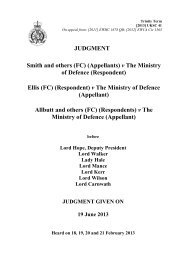
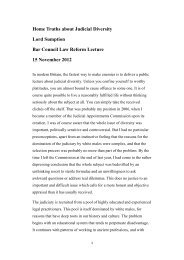


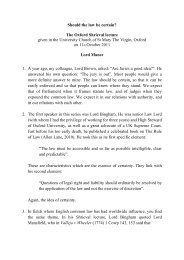
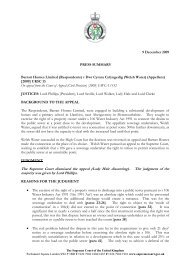

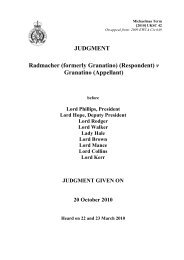
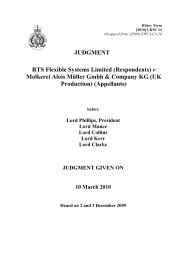
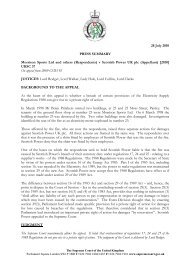
![[2009] UKSC 10 - The Supreme Court](https://img.yumpu.com/8582038/1/184x260/2009-uksc-10-the-supreme-court.jpg?quality=85)
